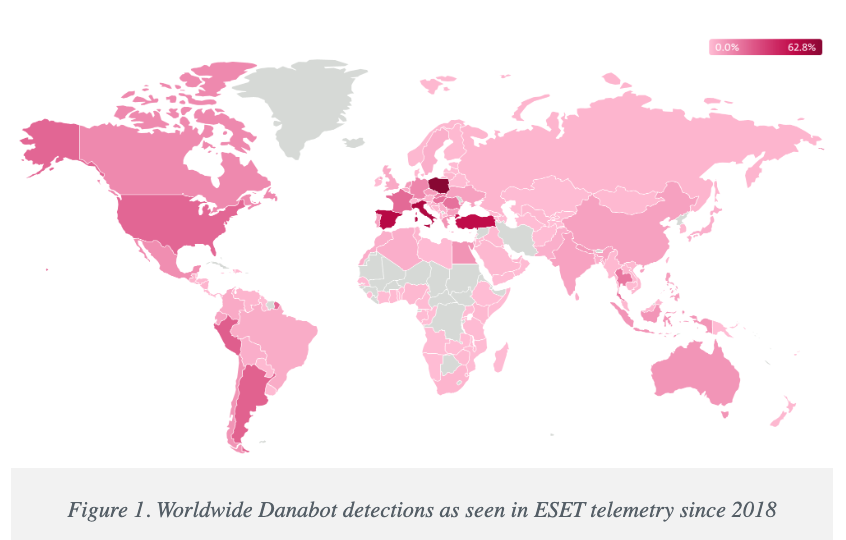The U.S. government today unsealed criminal charges against 16 individuals accused of operating and selling DanaBot, a prolific strain of information-stealing malware that has been sold on Russian cybercrime forums since 2018. The FBI says a newer version of DanaBot was used for espionage, and that many of the defendants exposed their real-life identities after accidentally infecting their own systems with the malware.

DanaBot’s features, as promoted on its support site. Image: welivesecurity.com.
Initially spotted in May 2018 by researchers at the email security firm Proofpoint, DanaBot is a malware-as-a-service platform that specializes in credential theft and banking fraud.
Today, the U.S. Department of Justice unsealed a criminal complaint and indictment from 2022, which said the FBI identified at least 40 affiliates who were paying between $3,000 and $4,000 a month for access to the information stealer platform.
The government says the malware infected more than 300,000 systems globally, causing estimated losses of more than $50 million. The ringleaders of the DanaBot conspiracy are named as Aleksandr Stepanov, 39, a.k.a. “JimmBee,” and Artem Aleksandrovich Kalinkin, 34, a.k.a. “Onix”, both of Novosibirsk, Russia. Kalinkin is an IT engineer for the Russian state-owned energy giant Gazprom. His Facebook profile name is “Maffiozi.”
According to the FBI, there were at least two major versions of DanaBot; the first was sold between 2018 and June 2020, when the malware stopped being offered on Russian cybercrime forums. The government alleges that the second version of DanaBot — emerging in January 2021 — was provided to co-conspirators for use in targeting military, diplomatic and non-governmental organization computers in several countries, including the United States, Belarus, the United Kingdom, Germany, and Russia.
“Unindicted co-conspirators would use the Espionage Variant to compromise computers around the world and steal sensitive diplomatic communications, credentials, and other data from these targeted victims,” reads a grand jury indictment dated Sept. 20, 2022. “This stolen data included financial transactions by diplomatic staff, correspondence concerning day-to-day diplomatic activity, as well as summaries of a particular country’s interactions with the United States.”
The indictment says the FBI in 2022 seized servers used by the DanaBot authors to control their malware, as well as the servers that stored stolen victim data. The government said the server data also show numerous instances in which the DanaBot defendants infected their own PCs, resulting in their credential data being uploaded to stolen data repositories that were seized by the feds.
“In some cases, such self-infections appeared to be deliberately done in order to test, analyze, or improve the malware,” the criminal complaint reads. “In other cases, the infections seemed to be inadvertent – one of the hazards of committing cybercrime is that criminals will sometimes infect themselves with their own malware by mistake.”

Image: welivesecurity.com
A statement from the DOJ says that as part of today’s operation, agents with the Defense Criminal Investigative Service (DCIS) seized the DanaBot control servers, including dozens of virtual servers hosted in the United States. The government says it is now working with industry partners to notify DanaBot victims and help remediate infections. The statement credits a number of security firms with providing assistance to the government, including ESET, Flashpoint, Google, Intel 471, Lumen, PayPal, Proofpoint, Team CYMRU, and ZScaler.
It’s not unheard of for financially-oriented malicious software to be repurposed for espionage. A variant of the ZeuS Trojan, which was used in countless online banking attacks against companies in the United States and Europe between 2007 and at least 2015, was for a time diverted to espionage tasks by its author.
As detailed in this 2015 story, the author of the ZeuS trojan created a custom version of the malware to serve purely as a spying machine, which scoured infected systems in Ukraine for specific keywords in emails and documents that would likely only be found in classified documents.
The public charging of the 16 DanaBot defendants comes a day after Microsoft joined a slew of tech companies in disrupting the IT infrastructure for another malware-as-a-service offering — Lumma Stealer, which is likewise offered to affiliates under tiered subscription prices ranging from $250 to $1,000 per month. Separately, Microsoft filed a civil lawsuit to seize control over 2,300 domain names used by Lumma Stealer and its affiliates.
Further reading:
Danabot: Analyzing a Fallen Empire
ZScaler blog: DanaBot Launches DDoS Attack Against the Ukrainian Ministry of Defense
Flashpoint: Operation Endgame DanaBot Malware
Team CYMRU: Inside DanaBot’s Infrastructure: In Support of Operation Endgame II
March 2022 criminal complaint v. Artem Aleksandrovich Kalinkin
September 2022 grand jury indictment naming the 16 defendants
Malicious hackers are exploiting a zero-day vulnerability in Versa Director, a software product used by many Internet and IT service providers. Researchers believe the activity is linked to Volt Typhoon, a Chinese cyber espionage group focused on infiltrating critical U.S. networks and laying the groundwork for the ability to disrupt communications between the United States and Asia during any future armed conflict with China.

Image: Shutterstock.com
Versa Director systems are primarily used by Internet service providers (ISPs), as well as managed service providers (MSPs) that cater to the IT needs of many small to mid-sized businesses simultaneously. In a security advisory published Aug. 26, Versa urged customers to deploy a patch for the vulnerability (CVE-2024-39717), which the company said is fixed in Versa Director 22.1.4 or later.
Versa said the weakness allows attackers to upload a file of their choosing to vulnerable systems. The advisory placed much of the blame on Versa customers who “failed to implement system hardening and firewall guidelines…leaving a management port exposed on the internet that provided the threat actors with initial access.”
Versa’s advisory doesn’t say how it learned of the zero-day flaw, but its vulnerability listing at mitre.org acknowledges “there are reports of others based on backbone telemetry observations of a 3rd party provider, however these are unconfirmed to date.”
Those third-party reports came in late June 2024 from Michael Horka, senior lead information security engineer at Black Lotus Labs, the security research arm of Lumen Technologies, which operates one of the global Internet’s largest backbones.
In an interview with KrebsOnSecurity, Horka said Black Lotus Labs identified a web-based backdoor on Versa Director systems belonging to four U.S. victims and one non-U.S. victim in the ISP and MSP sectors, with the earliest known exploit activity occurring at a U.S. ISP on June 12, 2024.
“This makes Versa Director a lucrative target for advanced persistent threat (APT) actors who would want to view or control network infrastructure at scale, or pivot into additional (or downstream) networks of interest,” Horka wrote in a blog post published today.
Black Lotus Labs said it assessed with “medium” confidence that Volt Typhoon was responsible for the compromises, noting the intrusions bear the hallmarks of the Chinese state-sponsored espionage group — including zero-day attacks targeting IT infrastructure providers, and Java-based backdoors that run in memory only.
In May 2023, the National Security Agency (NSA), the Federal Bureau of Investigation (FBI), and the Cybersecurity Infrastructure Security Agency (CISA) issued a joint warning (PDF) about Volt Typhoon, also known as “Bronze Silhouette” and “Insidious Taurus,” which described how the group uses small office/home office (SOHO) network devices to hide their activity.
In early December 2023, Black Lotus Labs published its findings on “KV-botnet,” thousands of compromised SOHO routers that were chained together to form a covert data transfer network supporting various Chinese state-sponsored hacking groups, including Volt Typhoon.
In January 2024, the U.S. Department of Justice disclosed the FBI had executed a court-authorized takedown of the KV-botnet shortly before Black Lotus Labs released its December report.
In February 2024, CISA again joined the FBI and NSA in warning Volt Typhoon had compromised the IT environments of multiple critical infrastructure organizations — primarily in communications, energy, transportation systems, and water and wastewater sectors — in the continental and non-continental United States and its territories, including Guam.
“Volt Typhoon’s choice of targets and pattern of behavior is not consistent with traditional cyber espionage or intelligence gathering operations, and the U.S. authoring agencies assess with high confidence that Volt Typhoon actors are pre-positioning themselves on IT networks to enable lateral movement to OT [operational technology] assets to disrupt functions,” that alert warned.
In a speech at Vanderbilt University in April, FBI Director Christopher Wray said China is developing the “ability to physically wreak havoc on our critical infrastructure at a time of its choosing,” and that China’s plan is to “land blows against civilian infrastructure to try to induce panic.”
Ryan English, an information security engineer at Lumen, said it’s disappointing his employer didn’t at least garner an honorable mention in Versa’s security advisory. But he said he’s glad there are now a lot fewer Versa systems exposed to this attack.
“Lumen has for the last nine weeks been very intimate with their leadership with the goal in mind of helping them mitigate this,” English said. “We’ve given them everything we could along the way, so it kind of sucks being referenced just as a third party.”